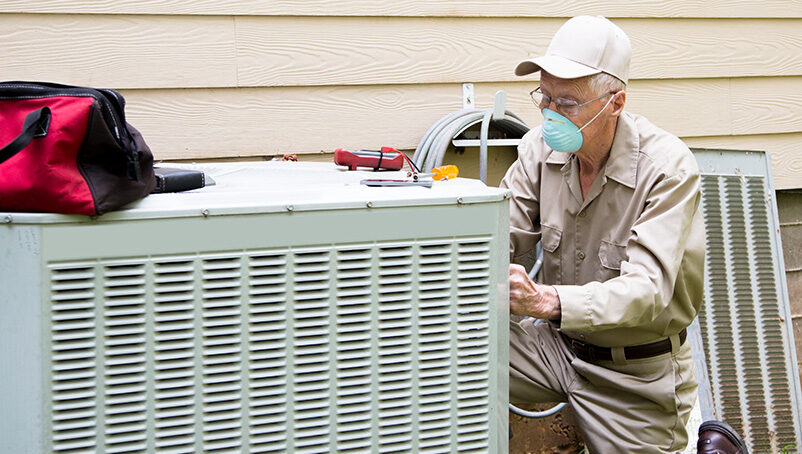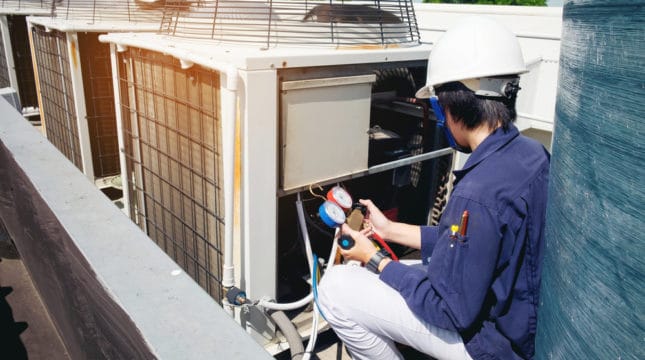How to get an HVAC license in North Carolina
To obtain a North Carolina HVAC license, submit your license application, the $100 license fee and a criminal background check to the proper state board:
If the Board confirms your licensure eligibility, you’ll receive information on how to sign up to take the license exam. You must earn a score of at least 70% on each part of the HVAC contractor exam to pass.
North Carolina HVAC license requirements
There are two types of HVAC licenses in North Carolina:
- Refrigeration contractor license
- Heating and cooling contractor license
The licensing process you’ll need to follow depends on the kind of work you do. North Carolina HVAC license reciprocity is not available for refrigeration or heating and cooling contractor licenses.
Refrigeration contractor license
According to the North Carolina State Board of Refrigeration Contractors, anyone who performs the “installation, maintenance, servicing and repairing of refrigerating machinery, equipment, devices and components” must have an active refrigeration contractor license.
There are four classes for this type of license:
- Class I: For commercial refrigeration contracting
- Class II: For industrial refrigeration contracting
- Class III: For refrigeration service contracting
- Class IV: For transport refrigeration contracting
Heating and cooling contractor license
Contractors who work on heating and cooling systems need this type of license. Depending on the systems you work with, you’ll need to choose one of these three license groups:
- H1: For any type of water-based heating system
- H2: For forced-air heating/cooling systems with a cooling capacity of more than 15 tons
- H3: For forced-air heating/cooling systems with a cooling capacity of 15 tons or less
You’ll need a class I contractor license in any of the above groups to work in residential, commercial or industrial buildings. Class II licenses are for single-family residences only. Class T is reserved for HVAC technician licenses.
The work experience and education requirements for both refrigeration contractor and heating and cooling contractor licenses are the same.
You must have at least 4,000 hours of relevant HVAC work experience acquired while working under the supervision of someone with an active contractor’s license. You may substitute academic or technical training directly related to the field for up to 2,000 hours of experience.
If you’re applying for a refrigeration contractor license, you must also provide documentation to show that you have the proper CFC Certification (also known as Section 608 technician EPA certification) to cover your scope of work.
Insurance for North Carolina HVAC contractors
HVAC contractors must meet specific insurance requirements in some parts of the state. For example, Iredell County, NC, requires all contractors to provide proof of insurance coverage if they work on county property.
Check with your local government to learn more about insurance coverage requirements and how to submit your certificate of insurance.
Depending on the nature of your work, you may want to obtain several types of HVAC insurance to help protect your business. Learn more about your North Carolina business insurance coverage options.
Workers’ compensation insurance
All North Carolina business owners with three or more employees must have workers’ compensation insurance. This insurance can help provide wage protection and other benefits when injuries occur on the job.
General liability insurance
NC general liability insurance can help can provide financial protection for some of the most common accidents at a business, including if someone other than an employee gets hurt or you damage someone’s property.
Tools and equipment insurance
If your work gear is stolen or damaged, tools and equipment insurance can help cover the repair and replacement costs.
Commercial auto insurance
Commercial auto insurance can help cover accident-related costs, including property damage and medical bills.
Commercial property insurance
If you rent or own property for your HVAC business, commercial property insurance can help cover costs related to damage or vandalism.
NC HVAC license renewal requirements
You must pay a fee of $80 for refrigeration contractor license renewal, which is required by October 31 of each year.
Heating and cooling contractor licenses expire on December 31 of each year and require a renewal fee of $150.
HVAC license bond requirements in North Carolina
Certain cities in North Carolina require a surety bond for HVAC contractors. For example, Greensboro, NC, requires a $2,000 bond, while Winston-Salem requires a $2,500 bond. Check with your local government to make sure that you are meeting the bond requirements for the areas where you work.
How NEXT helps support North Carolina HVAC contractors
NEXT specializes in small business insurance. We can put together a custom HVAC insurance package at affordable rates that could help save you money every month.
We’ll ask a few questions about your business and give you a quote. You can select your coverage options and purchase your policy — all in about 10 minutes. Your certificate of insurance will be available immediately, and you can access your policy 24/7 via web or mobile app.
Start a free quote with NEXT today.





